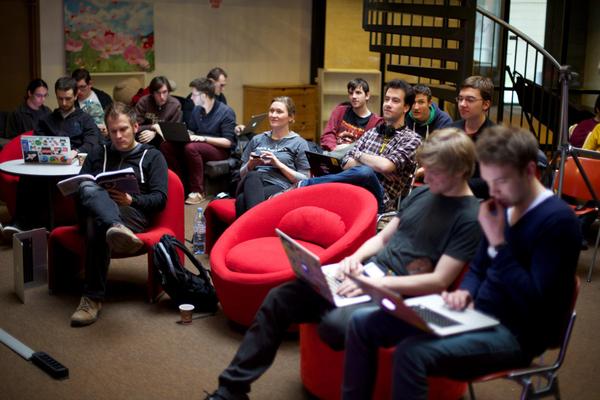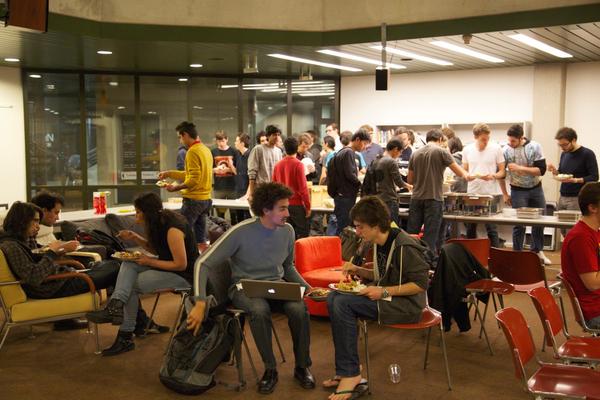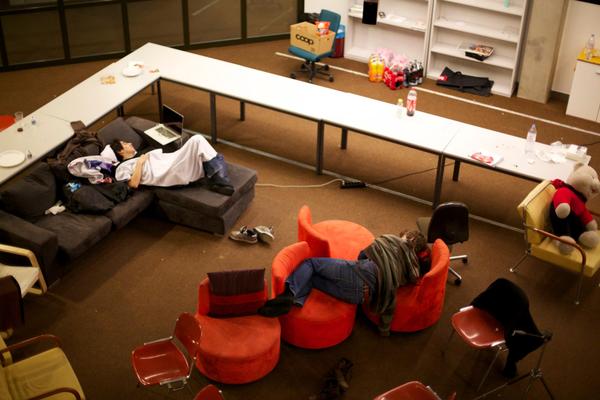30 hours non-stop of coding?

© 2013 Hackers at EPFL
Have you ever heard of Hackathons? Not yet an Olympic sport, they are nevertheless a mental and physical strain! Gather together dozens of programmers, order food, and code all day and all night long.
Students from the School of Computer and Communication Sciences and Facebook engineers organized such an event on the EPFL campus.
Let’s walk back through these 30 hours of hard work.
A hacking marathon, that’s what more than 50 programmers went through on the 23rd-24th of March 2013.
Everything started with "Hackers at EPFL", a new EPFL association founded by Michele Catasta (PhD student), Frédéric Jacobs and Romain Ruetschi (both bachelor students). They decided to organize a Hackathon with the help of Facebook employees. Girish Patangay, an engineer at Facebook explains: "Many major projects started out as a hack during one of our internal company hackathons – chat, like button, timeline, video – just to name a few. Hackathons are a core company tradition at Facebook, it allows us to work on ideas that are floating in the back of our minds but are not really part of our day job. Hackathons also provide a venue for different groups of people to collaborate on projects that normally wouldn't meet. For example, the Facebook timeline started out as a hackathon project between three engineers from different teams and one designer."
 "Hackathons are such popular events in the USA that sometimes they can easily attract 200 people, all sharing a passion for improving open-source software, prototyping novel ideas, etc. It had never happened here at EPFL, so we didn’t know what to expect," explains Michele. Frédéric continues: “But we knew it was worth it, hackathons are dope!” “Exactly! And you never know what the outcome will be; maybe a project worth pursuing, or even a startup idea, as well as new friends and connections," says Romain.
"Hackathons are such popular events in the USA that sometimes they can easily attract 200 people, all sharing a passion for improving open-source software, prototyping novel ideas, etc. It had never happened here at EPFL, so we didn’t know what to expect," explains Michele. Frédéric continues: “But we knew it was worth it, hackathons are dope!” “Exactly! And you never know what the outcome will be; maybe a project worth pursuing, or even a startup idea, as well as new friends and connections," says Romain.
In the end, more than 50 people came mostly from EPFL but also from ETHZ, Geneva’s design school HEAD or the University of Fribourg.
Are "programmers" well-intentioned "hackers"?
Especially in the media, there is this common idea that "hackers" are ill-intentioned persons who break into computers. However, among ICT (Information and Communication Technologies) engineers, it just means someone who can find quick and easy solutions to non-traditional technological riddles. Hence, there is a big difference between "hacktivism" and "scientific" hacking: the goal of the latter is to burst with creativity, while finding deficiencies in machines and computer systems. The net gain is continuous improvement in the security, reliability and efficiency of the technology that surrounds us.
 Quoting Paul Graham (programmer, writer, and investor who started Viaweb acquired by Yahoo and Y Combinator), "It is by poking about inside current technology that hackers get ideas for the next generation. (…) The next generation of computer technology has often – perhaps more often than not – been developed by outsiders."
Quoting Paul Graham (programmer, writer, and investor who started Viaweb acquired by Yahoo and Y Combinator), "It is by poking about inside current technology that hackers get ideas for the next generation. (…) The next generation of computer technology has often – perhaps more often than not – been developed by outsiders."
That’s what a hackathon is organized for: to gather programmers, designers, "builders", and innovators of all sorts to spur new ideas and develop something valuable in a 30-hour rush. "The rules were rather simple," clarifies Michele. "Participants arrived either with some fresh ideas, or with a work in progress. In the latter case, they would only present the latest improvements made during the hackathon."
 30 hours of coding
30 hours of coding
For a premier, the event was smoothly run. Most of the participants stayed overnight and made strenuous improvements to their projects. The Facebook organizers contributed with their longstanding experience on hackathons, keeping the morale up with a perfectly crafted mix of food, music and much-needed caffeine (especially at night).
Alok Menghrajani and Wojciech Galuba, both EPFL PhDs now working at Facebook, explain: "We have always found hackathon nights to be very exciting events, filled with energy and positive collaboration among engineers. It's also fun to be able to quickly build working prototypes and then demo them to the entire company."
All participants competed on a friendly basis. Some of them teamed up around a chosen idea, others preferred to work alone. Everyone played fair, and even the Facebook engineers created their own hacks while helping the students. As in any Facebook hackathon, the code now entirely belongs to their creators.
At the end, 14 high-quality hacks were presented by undergrads, grad students and Facebook engineers.
And the winner is…
The two winning teams didn’t work on a Facebook-based project, yet they were able to impress the engineers with the quality of their hacks. The first hack, built by a student from ETHZ, drastically improved the downloading functionalities of Firefox. The other winners (a team of 4, mainly from EPFL) developed SquareTune, a mobile platform to let people decide what song should play next during a party, thanks to a smart combination of QR codes and YouTube embedding.
Girish Patangay invited the winners to attend the Facebook worldwide University Hackathon, where the regional competition for Europe is taking place at the London offices.
Good luck to Hamza Zia, Philippe Schwaller, Christophe Tafani-Dereeper, Emmanuel Body-Hinrichsen, and Hadrien Milano!